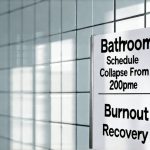The seemingly mundane routines we take for granted – brushing teeth, showering, using the toilet – are deeply interwoven with our social lives and psychological wellbeing. These rituals aren’t simply about hygiene; they’re often timed around work schedules, family needs, or even anticipation of interactions with others. When those external structures crumble, as happened dramatically during periods of widespread social isolation like lockdowns experienced globally in recent years, the very fabric of our daily routines unravels, and this impacts surprisingly intimate aspects of life, including bathroom patterns. What was once a seamless part of the day can become fraught with difficulty, marked by changes in frequency, urgency, or even an altered perception of bodily functions. This is not necessarily indicative of illness, but rather a natural response to profound shifts in lifestyle and mental state.
The connection between our psychological health and physiological processes is well-established. Stress, anxiety, and depression can all manifest physically, affecting digestion, sleep patterns, and – crucially – bladder and bowel function. Social isolation exacerbates these conditions, creating a feedback loop where altered bathroom habits contribute to feelings of unease or shame, further reinforcing the isolation. It’s important to understand that changes in these routines aren’t always negative; sometimes they represent an adaptation to a new reality, a way to cope with a loss of control, or a manifestation of shifted priorities. This article will explore how social isolation can specifically influence bathroom patterns, examining both the psychological and physiological mechanisms at play, and offering insights into understanding and navigating these changes.
The Impact on Bowel Movements & Digestive Function
Social isolation often leads to decreased physical activity and altered dietary habits – two significant contributors to changes in bowel movements. Constipation is a common complaint during periods of reduced movement, as exercise stimulates the digestive system. Similarly, comfort food consumption tends to increase when people are stressed or bored, leading to diets lower in fiber and higher in processed foods, further exacerbating constipation. But it’s not just about diet; the psychological impact plays a huge role. The stress associated with isolation can disrupt the gut-brain axis – the bidirectional communication system between the digestive tract and the brain. This disruption can lead to altered motility (the movement of food through the digestive system), resulting in both constipation and diarrhea, depending on individual vulnerabilities and coping mechanisms.
Furthermore, the lack of social pressure or accountability can contribute to neglecting regular bowel habits. When routines are disrupted and time loses its structure, individuals may delay going to the bathroom, leading to harder stools and increased difficulty. This can create a cycle of avoidance, where the fear of discomfort reinforces procrastination, ultimately worsening constipation. Conversely, anxiety and stress can accelerate digestive processes in some individuals, resulting in more frequent bowel movements or even irritable bowel syndrome (IBS)-like symptoms. The key takeaway is that there’s no single predictable response; changes in bowel habits are highly individualized and influenced by a complex interplay of factors.
The shift to remote work and reduced social interaction also impacts the ‘privacy’ associated with using the bathroom. Previously, quick trips might have been easily masked within workplace routines or social activities. During isolation, these moments become more pronounced, potentially leading to increased self-consciousness about bodily functions. This heightened awareness can contribute to anxiety around bowel movements, creating a vicious cycle of stress and digestive disruption. Ultimately, understanding that these changes are often a response to situational factors rather than inherent flaws is crucial for managing them effectively. Considering food energy patterns can also provide clarity.
The Role of Stress & Anxiety
Stress hormones, like cortisol, significantly impact the gastrointestinal system. Chronic stress, which is often heightened during social isolation, can lead to a dysregulation of this system. This means that the normal processes of digestion and elimination become disrupted. – Cortisol can slow down gut motility, leading to constipation. – It can also increase intestinal permeability (often called “leaky gut”), allowing undigested food particles and toxins to enter the bloodstream, potentially triggering inflammation. – Anxiety about using the bathroom – a fear of accidents or discomfort – further amplifies these effects, creating a self-perpetuating cycle of stress and digestive issues.
The brain’s limbic system, responsible for emotional processing, is closely linked to the gut. When anxiety levels rise, the limbic system sends signals to the gut, triggering changes in muscle contractions, inflammation, and sensitivity. This can manifest as abdominal pain, bloating, gas, or altered bowel habits. It’s important to recognize that these symptoms are not necessarily indicative of a serious medical condition but rather a physiological response to psychological distress. Therefore, addressing the underlying stress and anxiety is often the most effective way to alleviate digestive problems associated with social isolation. Learning about hidden gut issues can provide peace of mind.
Strategies for managing stress during isolation include: 1) Practicing mindfulness or meditation. 2) Engaging in regular physical activity (even indoors). 3) Maintaining social connections through virtual means. 4) Seeking professional support if needed, such as therapy or counseling. These steps can help regulate the nervous system and reduce the impact of stress on the digestive system. It’s also helpful to understand digestive clues that might appear.
Sleep Disruption & Its Consequences
Social isolation frequently disrupts sleep patterns. The lack of regular schedules, increased screen time, and heightened anxiety all contribute to poor sleep quality. Sleep deprivation has a profound effect on gut health and bowel function. – During sleep, the body repairs itself and regulates hormone production, including those that influence digestion. – Lack of sleep can disrupt these processes, leading to inflammation and altered motility. – It also impacts the vagus nerve, which plays a crucial role in regulating digestive functions.
A disrupted circadian rhythm – our internal biological clock – further exacerbates these issues. When we don’t have consistent routines or exposure to natural light, our bodies struggle to regulate physiological processes effectively. This can lead to irregular bowel movements and increased digestive discomfort. Moreover, sleep deprivation often leads to increased cortisol levels, amplifying the stress response and contributing to a vicious cycle of anxiety and gut dysfunction.
Restoring healthy sleep habits is essential for managing bathroom patterns during and after periods of social isolation. Implementing a regular sleep schedule, creating a relaxing bedtime routine, limiting screen time before bed, and ensuring a dark and quiet sleep environment can all help improve sleep quality and restore digestive function. It’s important to note that GI testing patterns may change with altered sleep schedules.
Addressing Shame & Seeking Support
Changes in bathroom habits can be deeply embarrassing for many people, leading to feelings of shame and reluctance to seek help. This is particularly true during social isolation, where individuals may feel more vulnerable and self-conscious about their bodies. It’s crucial to remember that these changes are often a normal response to abnormal circumstances and not a sign of personal failure or illness. – Normalizing conversations around bodily functions can reduce stigma and encourage people to seek support when needed. – Recognizing that many others are experiencing similar challenges can also be incredibly validating.
If changes in bathroom patterns persist or significantly impact quality of life, it’s important to consult with a healthcare professional. While the issue is often related to psychological factors and lifestyle adjustments, underlying medical conditions should be ruled out. A doctor can provide guidance on appropriate interventions, such as dietary modifications, stress management techniques, or referral to a therapist specializing in gut-brain health. Which digestive tests are covered by insurance may also be helpful information when considering seeking support.
Self-compassion is also key. Be kind to yourself during this time and acknowledge that adapting to significant changes takes time and effort. Focus on small, achievable goals and celebrate successes along the way. Remember that prioritizing your physical and mental wellbeing is essential for navigating these challenges and restoring a sense of normalcy. It’s worth considering if air swallowing might be contributing to discomfort, too. Finally, exploring bloat-free food combinations can further help manage digestive distress.


















